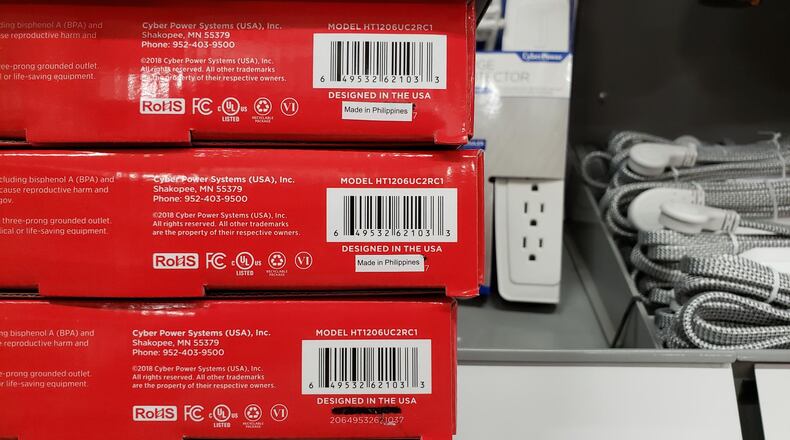As a result, Customs launched an investigation, learning the surge protectors could pose a safety risk.
“We appreciate you bringing this product to us because it now is resulting in an investigation into that company to try to determine why those stickers placed on that product to show a different country of origin,” said Donald Yando, the CBP director of field operations Atlanta.
A tipster first shared a cell phone video of stickers that said “Made in Philippines” over blacked out printing that said “Made in China” on surge protectors.
A WHIO employee went to stores and found stickers that said “Made in Philippines” covering up the “Made in China” printed on the packaging and some actual surge protectors made by the U.S. company Cyber Power.
Director Yando said that could be a big problem.
“Because that sticker can be peeled back, and you can still see that other country of origin, it is not acceptable,” Yando said.
News Center 7’s sister TV stations in Atlanta, Boston, Pittsburgh, Charlotte, Memphis, Jacksonville and Orlando also purchased the surge protectors.
WSB-TV investigative reporter Dave Huddleston took the surge protectors to the interview with Yando and showed him the stickers.
When asked if he would be comfortable buying these products, Yando said “Uh, no I would not.”
“Why is this important for consumers? Why is it important for their safety?” Huddleston asked.
>> State shuts down 5 rides at Ohio State Fair
“So, it’s extremely important for the consumer to know what they’re buying,” Yando replied.
Customs is working closely with the Consumer Product Safety Commission.
“Some unscrupulous companies will counterfeit that Underwriters Laboratories label and the electronic product could be made with substandard components that could cause a fire,” said Yando.
CPSC said it has not opened an investigation, but “will monitor this product for any indication of a potential safety hazard.”
But Customs is investigating whether Cyber Power is evading tariffs.
“At face value it does to me. It does look like an attempt at duty evasion,” said Yando.
Ray Hill, a professor at the Goizueta Business School at Emory University detailed tariffs placed on products made in China in 2018.
“Well a tariff is basically a sales tax on imports from another country,” said Hill.
Yando said surge protectors coming from China have a duty rate of 25 percent. That money goes to the U.S. Treasury to pay the government’s bills.
But if surge protectors are imported from any other country that rate is zero.
“So, you can see why unscrupulous parties may want to change that country of origin marking to avoid paying that 25 percent duty rate,” said Yando.
>> Ex-Children’s Services director admits to theft charges
Cyber Power emailed this statement:
“We take compliance with all applicable laws seriously, including laws related to country of origin labeling and disclosure, and our practice is to appropriately and permanently label our products and packaging accurately and clearly. More broadly, it is our intent to use caution and to comply with all US customs requirements when importing products manufactured in other countries.
We began shifting the manufacturing of some products from China to the Philippines in the fourth quarter of 2018. At that time, we still had a supply of packaging that showed the country of origin as China. Rather than discard the printed packaging, we decided to save costs and be environmentally responsible by re-labeling the existing package with the new country of origin information. To do so, we used a two-step process by first crossing out the existing ‘Made in China’ printing and then re-labeling the package with the ‘Made in Philippines’ label.
In the case of the one package that did not have a label shown in the image you provided, we can only speculate that the label must have been removed somehow. At no time did we mean to confuse or deceive our customers, partners or the public.”
But Cyber Power did not explain why some of the actual products said “Made in China” or why some products had “Made in Taiwan” stickers.
Customs has requested more information from Cyber Power and the factories where the surge protectors are made and could send investigators to visit them.
>> Dayton corruption probe: What is it like to be a target of the FBI?
Companies caught evading tariffs could face criminal or civil prosecution.
“So, we’ve seen prison, prison time for company officials, a five-year prison sentence we’ve seen. We’ve seen monetary penalties,” said Yando.
University of Pittsburgh business professor Josephine Olson said the bottom line is “cheating is always a bad way to get around the rules.”
Customs said its investigation into whether this is tariff evasion could take anywhere from a month to about six months. The I-Team will keep following it and report the outcome.
In a statement, a Home Depot spokesperson said: “We require all our vendors to follow applicable laws and regulations.”
Customs said both Home Depot and Cyber Power are cooperating.

